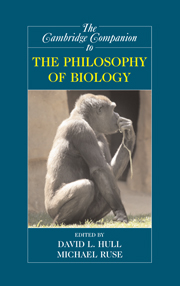Book contents
- Frontmatter
- 1 Adaptation
- 2 Population Genetics
- 3 Units and Levels of Selection
- 4 What’s Wrong with the Emergentist Statistical Interpretation of Natural Selection and Random Drift?
- 5 Gene
- 6 Information in Biology
- 7 Reductionism (and Antireductionism) in Biology
- 8 Mechanisms and Models
- 9 Teleology
- 10 Macroevolution, Minimalism, and the Radiation of the Animals
- 11 Philosophy and Phylogenetics: Historical and Current Connections
- 12 Human Evolution: The Three Grand Challenges of Human Biology
- 13 Varieties of Evolutionary Psychology
- 14 Neurobiology
- 15 Biological Explanations of Human Sexuality: The Genetic Basis of Sexual Orientation
- 16 Game Theory in Evolutionary Biology
- 17 What Is an ‘Embryo’ and How Do We Know?
- 18 Evolutionary Developmental Biology
- 19 Molecular and Systems Biology and Bioethics
- 20 Ecology
- 21 From Ecological Diversity to Biodiversity
- 22 Biology and Religion
- 23 The Moral Grammar of Narratives in History of Biology: The Case of Haeckel and Nazi Biology
- Reference List
- Index
- Series List
16 - Game Theory in Evolutionary Biology
Published online by Cambridge University Press: 28 April 2008
- Frontmatter
- 1 Adaptation
- 2 Population Genetics
- 3 Units and Levels of Selection
- 4 What’s Wrong with the Emergentist Statistical Interpretation of Natural Selection and Random Drift?
- 5 Gene
- 6 Information in Biology
- 7 Reductionism (and Antireductionism) in Biology
- 8 Mechanisms and Models
- 9 Teleology
- 10 Macroevolution, Minimalism, and the Radiation of the Animals
- 11 Philosophy and Phylogenetics: Historical and Current Connections
- 12 Human Evolution: The Three Grand Challenges of Human Biology
- 13 Varieties of Evolutionary Psychology
- 14 Neurobiology
- 15 Biological Explanations of Human Sexuality: The Genetic Basis of Sexual Orientation
- 16 Game Theory in Evolutionary Biology
- 17 What Is an ‘Embryo’ and How Do We Know?
- 18 Evolutionary Developmental Biology
- 19 Molecular and Systems Biology and Bioethics
- 20 Ecology
- 21 From Ecological Diversity to Biodiversity
- 22 Biology and Religion
- 23 The Moral Grammar of Narratives in History of Biology: The Case of Haeckel and Nazi Biology
- Reference List
- Index
- Series List
Summary
INTRODUCTION
Game theory is now a standard tool for explaining puzzling and counterintuitive behavior. But in spite of the fact that game theory was developed to investigate rational and economic behavior of modern humans, it has found equally valuable application in biology. For example, it has often been observed that when fights break out between members of the same species, the antagonists often display restraint by not inflicting serious injury on each other during the fight. To take another example, individual guppies will sometimes go out of their way to swim beside a larger fish that may turn out to be a predator (Dugatkin and Alfieri 1991a, b). And chimpanzees will often raise an alarm to the rest of their group when they spot a dangerous predator, in spite of the fact that an individual who does so will attract the attention of the predator.
These behaviors should be puzzling to anyone who thinks of evolution as 'nature red in tooth and claw'. However, they can all be explained in a very satisfying way by applying simple game-theoretic analyses. The purpose of this chapter is to illustrate enough game theory to show how it may be applied to the task of explaining such puzzling behavior. Although the range of such behaviors is extremely large, and the range of available game-theoretic techniques is equally large, I shall focus on game-theoretic explanations of one particular kind of behavior - namely, altruism.
- Type
- Chapter
- Information
- The Cambridge Companion to the Philosophy of Biology , pp. 304 - 323Publisher: Cambridge University PressPrint publication year: 2007
- 1
- Cited by



